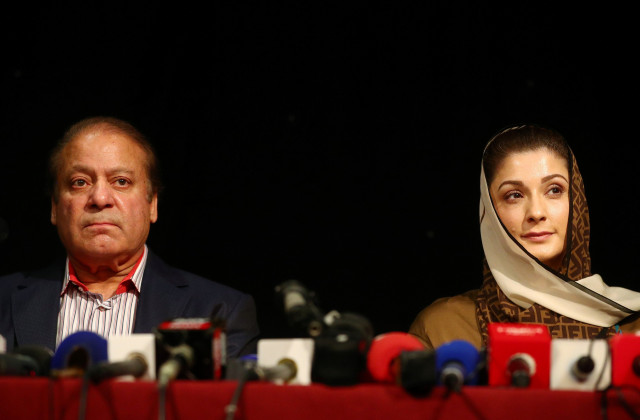'Glaring defects’ in trial court’s July 6 verdict: IHC
Opines that Sharif’s July 6 convictions may not be ultimately sustainable

Filed photo of Nawaz and Maryam holding a press conference in London, UK. PHOTO: AFP
“In the light of the above obvious and glaring defects and infirmities in the judgment, we have formed a prima facie, tentative opinion that the convictions and sentences handed down to the petitioners may not be ultimately sustainable,” said the IHC’s detailed judgment released on Wednesday.
The IHC judges – Athar Minallah and Miangul Hassan Aurangzeb – noted that when the National Accountability Bureau’s (NAB) counsels were asked to show the relevant portion of the accountability court’s verdict, or any evidence, reflecting value of the Avenfield Apartments, they referred to Google.
“Rather than referring to the judgement or any document from the record they stated that values could be obtained through Google,” said the IHC judgement. “This answer was not expected from counsels who have enviable professional experience and competence, because after conclusion of trial no document other than those which have been brought on record can be considered or the appellate court takes further evidence under section 428 of the CrPC,” it added.
The bench observed that there is force in the argument of Shairf’s counsel Khawaja Haris that Nawaz Sharif’s connection with the Avenfield Apartments was made on presumption that the children were his dependents at the relevant time.
The judges noted that Haris’s question was important that there has been no determination of the value of assets mentioned by the accountability court Judge Muhammad Bashir in his July 6 judgement.
Surprisingly, the IHC judges also stated that the accountability court has not referred to any evidence which would connect Maryam Nawaz to have aided, assisted or conspired with her father at the time when the apartments were said to have been acquired between 1993 and 1996.
In addition, the judges said, the NAB’s reference, charge framed by the court and the final judgement do not refer to Sharif’s “exact income, the sources of his income or the details of resources so that the same could be set up against the value of the Avenfield Apartments for alleging that he had acquired them disproportionate to his known sources of income.”
The IHC’s judgment said Sharifs were alleged to have acquired the apartments by corrupt, dishonest or illegal means. However, the accountability court’s judgement held that “Prosecution have not brought evidence in respect of section 9(a)(iv) NAO, 1999. So the accused are acquitted under that section of law”. The IHC added that the “bureau (NAB), in its wisdom, has not challenged the said acquittal.”
The IHC’s judges said the accountability court in the judgement has also not recorded reasons for handing down lesser sentences. “It would lead to causing hardship to the petitioners if the relief by way of suspension of sentences is withheld. We, therefore, allow these petitions in terms of the short order passed on 19.09.2018,” IHC judgement ruled.
Moreover, the call-up notices in relation to which the convictions have been recorded did not put the petitioners to notice that noncompliance would attract penal consequences. The petitioners had admittedly responded to the call-up notices and the trial court has not recorded reasons in the judgement in this regard, the IHC said.
The judges said NAB’s counsels could not give any plausible explanation of how Sharif has been held to have acquired London flats and how he has been convicted under the offence defined under section 9(a)(v) of NAB Ordinance of 1999.
The IHC judges said the only document regarding Sharif’s assets and liabilities referred to in the judgement is an “analysis chart of assets and liabilities” but defence counsel’s objection regarding admissibility of the chart was not decided and later it was reproduced at page 59 of the judgment.
After acquitting Sharifs under section 9(a)(iv) of NAB Ordinance of 1999, they judges noted that Haris’ argument hold force that trial court should have considered whether, on the same evidence and relating to the same property, a conviction could be handed down under section 9(a)(v) by assuming, through a fiction of law, that Avenfield Apartments had been acquired through corruption and corrupt practices.
“In the light of the above obvious and glaring defects and infirmities in the Judgment we have formed a prima facie, tentative opinion that the convictions and sentences handed down to the Petitioners may not be ultimately sustainable,” IHC ruled.
On Sept 19, the IHC suspended the sentences awarded to Sharifs and ordered to release them exactly after spending 69 days in Adiala jail. In the judgement that will echo across the political landscape of Pakistan for decades, the accountability court had sentenced deposed PM to 10-years, Maryam to 7-years and Captain (retd) Safdar to two-year rigorous imprisonment.






1724319076-0/Untitled-design-(5)1724319076-0-208x130.webp)












COMMENTS
Comments are moderated and generally will be posted if they are on-topic and not abusive.
For more information, please see our Comments FAQ